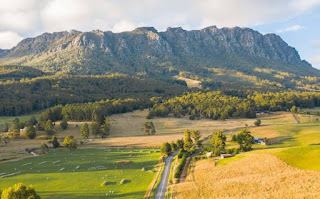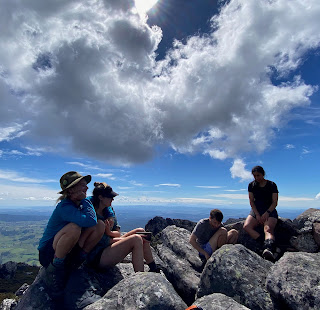the character of mountains and the ethics of adventure
On the drive away from Mount Roland in northern Tasmania, we were talking about how this mountain felt inviting, friendly almost. It's not that her dolerite peaks and jagged rocky faces don't deserve deep respect. We wondered out loud ...
I'm not a mountain person really, but I am fascinated by the idea that mountains, and the environment more generally, have personality and character. Mount Roland is not part of a range, at least not a significant one. It rises alone from the farming landscape. It owns a community ... the rural village of Sheffield is strongly associated with the mountain and indeed, she gives the town its character. Her foothill slopes appear gentle and even 'organised' as the cleared land and forests give way to imposing cliff faces. The way the cleared land and trees are organised around her skirt invite excursion.
In my uni days I was friends with people who built a hut at the top of one of the bits of cleared land, right on the edge of the dolerite. I was lucky enough to retreat to the hut with mates many times, where we soaked in the incredible views out over the Kentish landscape and the Meander Valley. Rich memories. Yesterday I had a peek on Google maps and was so happy to see the hut still there, although it looks a bit bigger than when I frequented it decades ago, so has probably been rebuilt. It is perhaps my having spent time with friends on her slopes that adds to the the sense of hospitality of the mountain.
In contrast, last night we were talking about the fragility and spectacular intimidation of a particular mountain range in the south west. There is a ton of current controversy about the increasing popularity and therefore the threat to the ecosystem. As Laura said, as you approach, in contrast to Mount Roland, they check you out. "really??? Are you sure you want to do this?"
Over a pot of peppermint tea, Rach, Laura and I wrestled with the dilemma of wilderness accessibility. Social media posts increase the visibility of these remote areas. The numbers of bushwalkers therefore balloons, which on the one hand enables more people to appreciate the preciousness of these areas while paradoxically threatening their ongoing accessibility. Parts of some walks down there are extremely dangerous and require high levels of technical hiking. Many walkers are ill equiped and risk their own lives and the lives of rescuers who are summoned with nonchalant entitlement.
As we talked I realised how much our western mindset is at the core of the problem. Our colonial, conquering mindset means we 'do' places. How many times do we hear our friends return from their entitled travel excursions having 'done' Paris, or Morocco or Antarctica? Travel bucket lists are symptoms of the problem mindset. And so people want to 'do' the Western Arthurs' or the Larapinta or whatever. Our relationship with the earth needs some work. The environment is not there to be conquered, to be 'done', to be wee-d on. It owns us, not the other way round.
'Doing' places is about us, our colonial attitude.
No doubt, travel is a wonderful thing. Being in different communities and environments opens our eyes to new perspectives and realities. It changes our scene and enables regeneration. But what does healthy sustainable travel look like? What is my attitude to the local host communities or the natural environments that I excursion into? What does respect look like? How does the experience of travel and adventure remain accessible, rather than the domain of the wealthy elite?
I also wondered about how the accessibility of adventure clothing and equipment offers people a false sense of competence. "I've got the boots and the jacket, the pack and the tent - I've got this." Essentially, if I've got means, I can go where ever I please. But should that be the case? Is entitled curiosity a good enough reason to go somewhere? I wondered about my own motivations for travel generally, and adventure bushwalking in particular.
I have more questions than answers. Of course these are not new questions, many have been wrestling with this stuff for a long time and then government agencies have to figure out how to translate into policy that gets the settings right to balance protection and accessibility. I wonder how we can cultivate a healthy respect for the environments we excursion into, in the face of the counter momentum of social media, where post-motivated-excursion is a veiled form of look-at-me tick-boxing. These are tricky social and environmental challenges.






Comments
Post a Comment